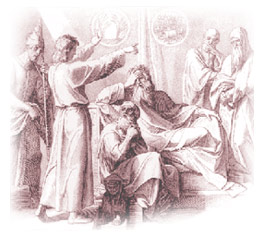|


Prof.
Nahum Sarna's approach in "Understanding Genesis" is to point out the cultural
and religious traditions the early Israelites shared with the ancient Near
Eastern world, while stressing the crucial points of departure from the
prevailing mythological and spiritual world-view. "These new ideas of Israel,"
writes Sarna in his introduction, "transcend, by far, the range of the religious
concepts of the ancient world. The presence of this or that biblical motif
or institution in non-Israelite cultures in no wise detracts from its importance,
originality and relevance." On the contrary, this scientific approach depicts
Israel as able to withstand and overcome powerful contemporary forces to
develop a unique moral civilization of universal and eternal value.
The passage below discusses how Israel shared with its pagan neighbors a
belief in the reality of dreams as a medium of divine communication, yet
never developed (as in Egypt and Mesopotamia) a class of professional interpreters
or a dream literature. |
Throughout
the biblical world, dreams were recognized as vehicles of divine communication.
Several instances of this are encountered in the book of Genesis. God revealed
His will in dreams to Avimelech, King of Gerar,[1]
to Jacob[2]
and to Laban.[3]
In each experience the theophany is straightforward and the message perfectly
clear. This is not the case with Joseph's dreams,[4]
nor with those of the butler and the baker[5]
and Pharaoh.[6]
Here, the symbol, not the words, is the language of intelligence, and the dream
is therefore enigmatic.
 Julius
Schnorr von Carolsfeld.
Julius
Schnorr von Carolsfeld.
Joseph Interprets Pharaoh's Dream. 1855.
From The Bible in Pictures (Glasgow, 1869).
Bodleian Library,. Oxford. |
Against this
background, it is not to be wondered at that dreams were frequently productive
of anxiety. To be ignorant of the true meaning was to be deprived of knowledge
that might well be vital to one's welfare. Notice how in each of the cryptic
dreams God does not figure explicitly in the content. Yet it is tacitly accepted
that He is the ultimate source of the message being conveyed. This does not
mean that the ancients did not recognize such a thing as an idle dream. They
did; and that is why dreams in the Joseph biography always comes in pairs: to
prove their seriousness.
In the two great center of Near Eastern civilization, Egypt and Mesopotamia,
at either extremity of the Fertile Crescent, the science of dream interpretation
was highly developed as a specialized skill, and a vast literature devoted to
the subject came into being. One extant Egyptian papyrus, inscribed about 1300
BCE and claiming to be a copy of an archetype at least five hundred years older,
is actually a reference book of dream interpretations arranged systematically
according to symbol and meaning. We are told, for example, that seeing a large
cat in a dream is good, for it portends a large harvest. Looking into a deep
well, on the other hand, is bad, for it is premonitory of incarceration.
The accepted predictive aspects of dreams was cause enough for the brothers
to take Joseph seriously. But insofar as a dream was recognized to be inseparable
from personality, it meant also that the dreamer somehow bore a measure of responsibility
for his dreams. Joseph's visions of lordship, therefore, betrayed his true aspirations
and contained, at the same time, the potentiality of fulfillment. That is why
they could arouse hostility so intense as to culminate in a conspiracy to murder.[7]
Looking at the dreams of the cupbearer, the baker and Pharaoh [Genesis 40-41],
we observe that whereas they all need the services of an interpreter to extract
meaning from the imagery, Joseph's dreams, although failing into the same symbolic
category, were at once comprehensible to the narrator and his brothers. This
distinction is more than incidental. Despite the fact that Israel shared with
its pagan neighbors a belief in the reality of dreams as a medium of divine
communication, it never developed, as in Egypt and Mesopotamia, a class of professional
interpreters or a dream literature. In the entire Bible, only two Israelites
engage in the interpretation of dreams — Joseph and
Daniel — and significantly enough, each serves a pagan
monarch, the one in Egypt, the other in Mesopotamia, precisely the lands in
which oneriomancy flourished. Moreover, in each case, the Israelite is careful
to disclaim any innate ability, attributing all to God.[8]
Nor does skill at dream interpretation play an part in the definition of biblical
wisdom or the equipment of prophet and sage.
|
[1]
Gen. 20:3 [back]
[2] Gen. 28:12ff; 31:11 [back]
[3] Gen. 31:24 [back]
[4] Gen. 37:5-10 [back]
[5] Gen. 40:5ff [back]
[6] Gen. 41:1ff [back]
[7] Gen. 37:5-20 [back]
[8] Gen. 40:8; Dan. 2:19-23,27,30 [back] |
|
 Nahum
M. Sarna is Emeritus Professor of Biblical Studies at Brandeis University.
Author of Understanding Genesis, Exploring Exodus, and On the
Book of Psalms, he is an editor and translator of the Jewish Publication
Society's translation of the Bible. Nahum
M. Sarna is Emeritus Professor of Biblical Studies at Brandeis University.
Author of Understanding Genesis, Exploring Exodus, and On the
Book of Psalms, he is an editor and translator of the Jewish Publication
Society's translation of the Bible.
|
DREAMS
Table of Contents

|